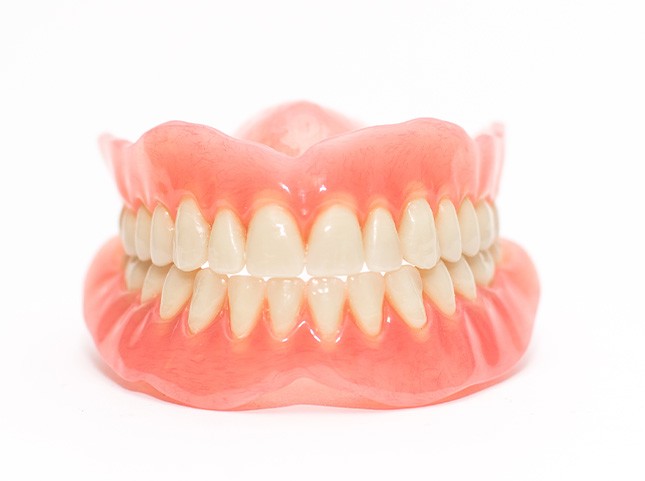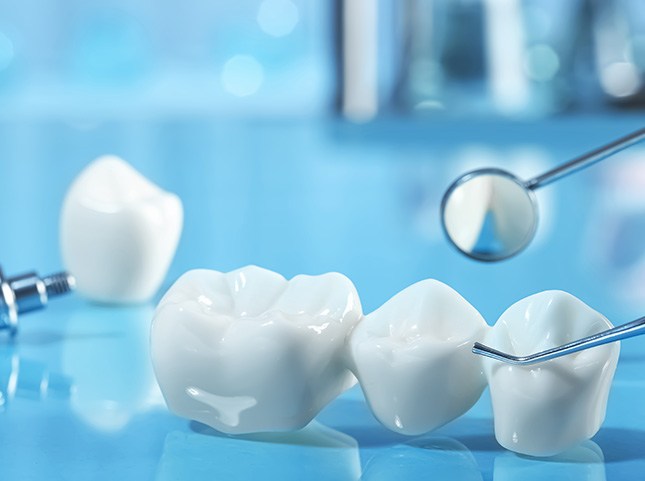Dentures – Newark, CA
A Reliable Way to Fill Smile Gaps
Missing some (or many) of your teeth is a rather harsh situation. After all, going without a full smile makes everyday tasks – chewing, speaking, smiling, etc. – harder. This effect and similar ones can lead to a lower quality of life. Still, there’s an excellent way to fix your problem: dentures in Newark! Newpark Mall Family Dental Group can use these prosthetics to restore your grin. If you’d like to learn more, simply keep reading or book a consultation visit.
Who's a Good Candidate for Dentures?

Regardless of how many teeth you’ve lost, anyone with gaps in their grin can potentially benefit from dentures. Before you can proceed, however, you must schedule a consultation with Dr. Quach to ensure that it’s the best treatment for your unique circumstances.
Continue reading to learn more about who can benefit from dentures so you can make an informed decision about your smile, and feel free to contact us with any questions.
Effects of Missing Teeth

Although tooth loss is more common in those who are 65+ years old, it’s possible for younger adults to need dentures, too. The leading cause of missing teeth is progressive periodontal disease because your gums recede to escape the infection, and without a firm foundation, your teeth and can fall out. Other culprits include extensive tooth decay (which can spread to the jawbone) or physical injury.
Whatever the cause, losing permanent teeth impacts everything from your speech patterns to your overall health. Without a full set of teeth, it’s harder to enunciate words and be clearly understood. Plus, spaces in your smile can contribute to gastrointestinal issues from swallowing overly large pieces of food or malnutrition if you cannot chew various ingredients. Also, your jawbone begins to deteriorate without a root to stimulate new bone growth when you bite down, leading to sunken cheeks and more wrinkly skin.
What Qualifies You for Dentures?

Although dentures are an incredibly versatile solution, that doesn’t mean they’re the best replacement teeth for every individual. They’re ideal for those who:
- Have sufficient jawbone density to support them.
- Are committed to oral care and will clean them consistently.
- Have healthy gum tissue to form a firm bond.
- Experience tooth sensitivity.
- Have overly decayed teeth beyond repair.
Before moving forward, you must consult with one of our dentists to ensure that you can sustain your prosthetics. They’ll examine your current dental condition and recommend an appropriate treatment based on their findings, whether it’s full, partial, or implant dentures.
Alternative Tooth-Replacement Options

Don't lose hope if you’re not a good fit for dentures right away! In some cases, you may need other procedures, like a gum or bone graft, to proceed.
Otherwise, there are other kinds of reliable, lifelike replacement teeth we can provide to rebuild your smile, such as:
- Dental bridges. These are great for folks who lost one or more teeth in a row. They contain the right number of pontics (artificial teeth) with a dental crown on either side that anchors to abutment teeth or implants by the gap in your grin.
- Dental implants. These are the only restorations directly embedded into your jawbone for added strength and resilience. They tend to cost more upfront but last longer, so you can save money in the long run.
Types of Dentures

Our dental team will outline the types of dentures available at the consultation. In other words, they’ll suggest you get one of the following three kinds:
Partial Dentures
A partial denture (per its name) replaces only a few teeth at a time. Given that fact, it fits onto your gumline with suction or clasps onto nearby “abutments” (i.e., anchor teeth). The device then relies on the coloring of its base and artificial teeth to blend with your smile. Its acrylic portion matches the pink tint of your gums, while each prosthetic tooth has the same shade as your enamel.
Full Dentures
Unlike the partial kind, a full denture replaces an entire arch of teeth. That means it relies solely on suction force to keep itself in place; dentists won’t alter your other teeth to place one. Even so, a full denture largely uses the same materials as a partial one. It, too, relies on gum-colored resin for its base and porcelain or ceramic artificial teeth.
Implant Dentures
As you may expect, implant dentures differ from other kinds. They’re held in place with dental implants – small restorations that fuse with your jawbone. As a result, they remain highly secure and stable over time. They never slip or fall from your mouth, and they work to prevent facial collapse.
Due to their traits, implant dentures are ideal for patients who want non-traditional options. They have perks and features that other choices can’t match.
The Benefits of Dentures

Gaps in your grin can detract from your daily quality of life because tasks that were once second-nature suddenly become much more challenging. When teeth go missing, it’s harder to eat, speak, and smile as confidently as you used to. Thankfully, wearing dentures restores your mouth’s functionality and appearance so that you can look and feel like the best version of yourself.
Continue reading below to learn more about how your restoration benefits you, and feel free to contact us for additional information.
Psychological Benefits

Many patients struggle emotionally with the sudden changes in their abilities and reflection. Unfortunately, if you have dental issues then you’re more likely to feel anxious, depressed, or even avoid spending time with other people. After all, it’s only natural to want to avoid social interactions when you’re worried about how you’ll be perceived.
By rebuilding your grin with prosthetics, you can boost your confidence and enjoy spending time with others. With them in place, you won’t feel like you have to remain tight-lipped or skip meals or conversations with people you care about.
Clearer Enunciation

Your teeth are essential in your ability to speak clearly because you press your tongue against them to form different sounds and words. When you have spaces in your smile, you might develop a lisp or other changes in your speech patterns that make it harder to communicate.
Replacing your missing teeth with dentures ensures that you’ll be able to talk more like you used to. It can take about a month for your tongue and other supporting muscles in your mouth to learn to work around them. Then, once you’ve acclimated, you’ll be able to express yourself accurately.
Improves Nutrition

Patients who have lost teeth are prone to developing different health issues like gastrointestinal problems or even malnutrition. Without a complete set, it’s difficult to thoroughly pulverize bites enough to be easily swallowed and digested, which can affect your general well-being. This is because many nutrient-rich foods are harder to bite into and chew, like tough meats or raw fruits and vegetables.
Dentures act as artificial teeth so you can once again enjoy a broader variety of foods to support your system.
Preserves Oral Health

Tooth loss doesn’t always happen all at once. If you still have natural teeth remaining, they’re prone to shifting out of alignment to fill in the gaps left behind by ones that fell out. This can wear down your enamel unevenly or prematurely, leaving you vulnerable to tooth decay, gum disease, and physical injuries.
Wearing prosthetics ensures that everything stays in its rightful place to safeguard your smile.
Expands Opportunities

When you’re trying to get ahead in life, it’s important to make a positive first impression. The quality of your grin is one of the first things that other people notice about you, and if yours is missing teeth, you could be remembered for the wrong reasons. In fact, once scientific study completed in 2019 found that the probability of being employed was negatively associated with poor dental health.
Replacing lost teeth with dentures allows you to put your best foot forward so you’re sure to impress at upcoming job interviews, romantic encounters, or other important occasions.

